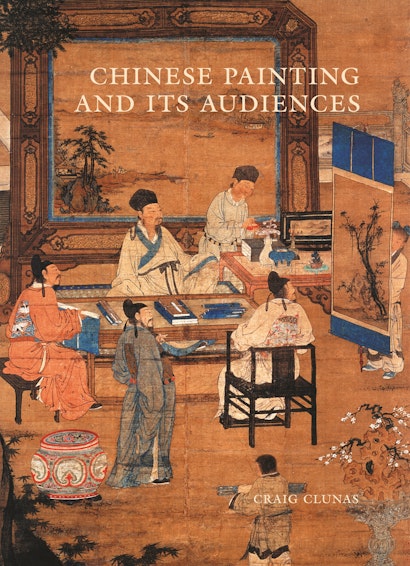What is Chinese painting? When did it begin? And what are the different associations of this term in China and the West? In Chinese Painting and Its Audiences, which is based on the A. W. Mellon Lectures in the Fine Arts given at the National Gallery of Art, leading art historian Craig Clunas draws from a wealth of artistic masterpieces and lesser-known pictures, some of them discussed here in English for the first time, to show how Chinese painting has been understood by a range of audiences over five centuries, from the Ming Dynasty to today. Richly illustrated, Chinese Painting and Its Audiences demonstrates that viewers in China and beyond have irrevocably shaped this great artistic tradition.
Arguing that audiences within China were crucially important to the evolution of Chinese painting, Clunas considers how Chinese artists have imagined the reception of their own work. By examining paintings that depict people looking at paintings, he introduces readers to ideal types of viewers: the scholar, the gentleman, the merchant, the nation, and the people. In discussing the changing audiences for Chinese art, Clunas emphasizes that the diversity and quantity of images in Chinese culture make it impossible to generalize definitively about what constitutes Chinese painting.
Exploring the complex relationships between works of art and those who look at them, Chinese Painting and Its Audiences sheds new light on how the concept of Chinese painting has been formed and reformed over hundreds of years.
Published in association with the Center for Advanced Study in the Visual Arts, National Gallery of Art, Washington, DC
Awards and Recognition
- Honorable Mention for the 2019 Joseph Levenson Pre-1900 Book Prize, China and Inner Asia Council of the Association for Asian Studies
- One of the Evening Standard Best Art Books of 2017 (chosen by David Ekserdijian)
- One ofThe New York Times Best Art Books of 2017, chosen by Jason Farago
"[An] engaging and finely illustrated study . . . Clunas veers from a formalist view of Chinese painting to look at how paintings were viewed—by solitary aristocratic scholars, by merchants plugged into global trade networks, by new Nationalist and Communist governments, and by western curators and collectors. This is magnificent scholarship, and a model of how art history can provide us new tools to understand a new power’s place in the world."—Jason Farago, New York Times
"Clunas's globalising approach undermines the old idea that Westerners can never truly understand Chinese painting."—John-Paul Stonard, London Review of Books
"Combines impeccable scholarly authority with a delightfully dry wit."—David Ekserdjian, Evening Standard
"Wonderful. . . . Open[s] a fresh window for us on the great adventure of Chinese art."—Magnus Fiskesjö, Art Newspaper
"Impressively researched and impeccably illustrated. . . . This book also offers a methodology broadly applicable to all fields of painting history. By analysing paintings that depict figures looking at paintings, art historians in any number of fields may recover mute histories of painting vividly documented in the medium itself. Thus even as Chinese Painting and Its Audiences seeks to establish Chinese painting on its own terms, it offers its readers methods for recovering and articulating ineffable histories of painting of all times, types, and places."—Jennifer Purtle, Art History
"This well-illustrated study offers shrewd analyses of Chinese paintings from the past five centuries, beginning in the mid-Ming dynasty of the 15th century. . . . This is a brilliant examination of one particular genre of Chinese painting. The author provides a richer understanding than would result from a more standard analysis of form and iconography."—Choice
"Absolutely lavishly illustrated."—Rana Mitter, Free Thinking
"[Chinese Paintings and Its Audiences] has all the markings of a classic; it is, and will probably remain for a long time, a must-read for specialists and non-specialists alike."—Lothar von Falkenhausen, China Review International
"Clunas's approach has both openness and humility; in his eyes the history of Chinese art is a global field, not an accessory in Western discourse, and naturally is not exclusive to China. Those scholars who also wish to see the history of Chinese art as a global field, will find the questions which Clunas raises in this book hard to avoid."—Liu Yu-jen, Chinese Studies
"Chinese Painting and Its Audiences brims with arresting arguments and flashes of insight familiar to readers of Clunas’s earlier publications. . . . [An] exhilarating book."—Robert E. Harrist Jr., Harvard Journal of Asiatic Studies
"With an elegant, welcoming conversational style and clear arguments, this book probes the ramifications of the modern English term 'Chinese painting.' Clunas brings to this work his unique combination of deep scholarship and deep knowledge of objects, the history of the art market, and the collection of Chinese art."—Patricia Berger, University of California, Berkeley
"Looking at a wide variety of media across a wide swath of time, Chinese Painting and Its Audiences repeatedly exposes unexpected ironies that undermine facile assumptions about the Chinese and European art traditions. With this innovative work, Clunas sets a new bar for the global history of art."—Martin Powers, University of Michigan


